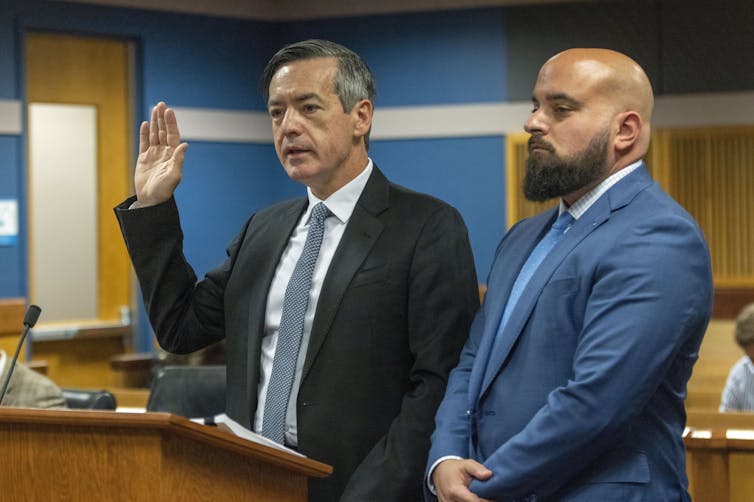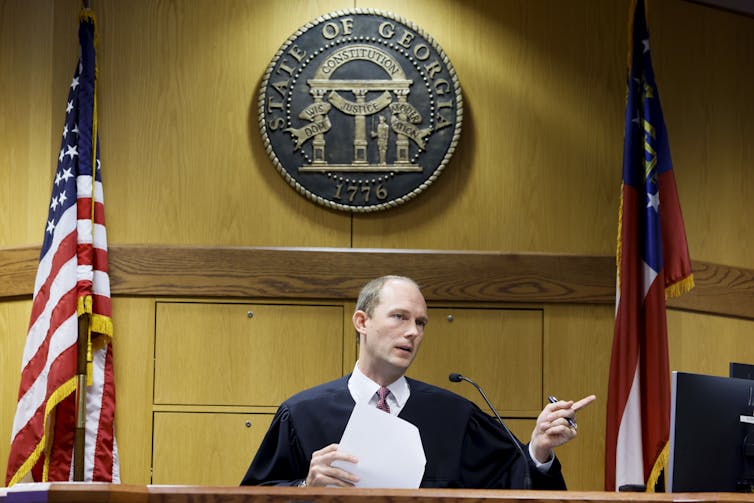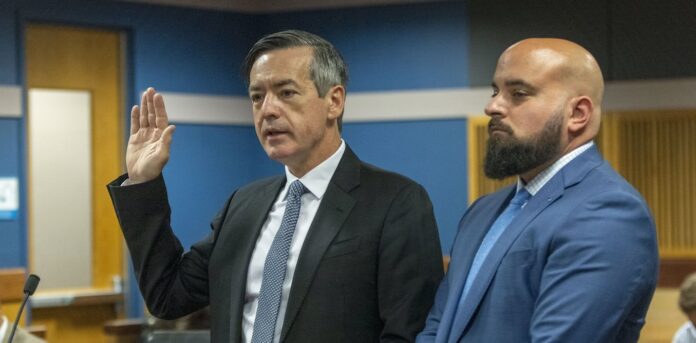Key Trump co-defendants accept plea deals – a legal expert explains what that means

By Cynthia Alkon, Texas A&M University
Sidney Powell and Kenneth Chesebro, two people charged in Georgia with racketeering and other crimes alongside former President Donald Trump, have accepted plea deals that let them avoid the jail time their original charges could have imposed. In exchange, they each agreed to provide testimony in the case.
The Conversation U.S. asked Cynthia Alkon, a law professor at Texas A&M University School of Law who studies plea bargaining, to explain what these legal agreements are and how they work.
1. What is a plea deal, or plea bargain, and how is it made?
A plea deal is a negotiated agreement between the prosecution and defense to settle a criminal case without going to trial. Well over 90% of resolved criminal cases end through plea deals and not jury trials.
The criminal legal system relies on plea bargaining to manage caseloads. Supreme Court Justice Anthony Kennedy, in the 2012 case Lafler v. Cooper, recognized this when he wrote that “criminal justice today is for the most part a system of pleas, not a system of trials.”
Plea deals may include agreements to dismiss charges or reduce charges. The plea negotiation process varies. The defendant might accept the first offer the prosecutor makes, or there might be extended back and forth between the defense and prosecution. Plea deals can also include conditions, such as that the defendant agree to testify against a co-defendant or in another case.
In many cases, the charges are straightforward, the defendant has no particular defense, and the prosecution offer will be accepted at arraignment, which is the first time a defendant appears in court. In other cases, the risk in going to trial is high, meaning the defendant could get sentenced to a much longer term in prison, and defendants choose to take the plea offer rather than risk a worse outcome after trial.
2. Why do prosecutors use plea deals?
Prosecutors have extraordinary power in the criminal legal system and are able to decide what charges to file and whether to make a plea offer. In most cases, the prosecutor will make a plea offer at some point. Defendants have no constitutional right to a plea deal – in fact, plea deals require defendants to waive three key constitutional rights: the right to a jury trial, to confront witnesses and to avoid self-incrimination.
Prosecutors rely on plea bargaining at times to strengthen their cases by offering deals contingent on a defendant agreeing to testify against another person. In the deals accepted by both Chesebro and Powell, they each agreed to cooperate with prosecutors and provide testimony in the case whose defendants include Trump.
In more serious cases, such as murder, plea deals are less frequent, but still happen regularly. Prosecutors may make offers with time conditions, such as the offer is good “today only.” If the defendant doesn’t accept by the deadline, the plea deal will be withdrawn.
The plea deal could also be withdrawn if the prosecutor gets new evidence, including information about additional prior convictions or that a new criminal case has been filed against the defendant.
3. Why do defendants use plea deals?
Defendants often do not have many options, and they generally have far less power and fewer resources than the prosecution. Due to the serious consequences of criminal convictions, including the possibility of long periods of time in prison, defendants are often left to choose between a bad plea offer and a worse outcome if they go to trial.
The vast majority of people arrested and charged with crimes are poor. Criminal defendants are disproportionately people of color, people with mental illness, people with substance abuse problems and who have suffered from trauma or have cognitive or other disabilities.
Indigent legal services, such as public defender offices, continue to be underfunded, and defendants may not have access to a lawyer, or their lawyer may not have time or resources to provide competent legal assistance.
Defendants may agree to take a plea deal because they do not want to risk going to trial or they do not want to spend the time to wait to go to trial. Concerns about wait times for trial can be even more of an issue for defendants who are in jail and are offered a “time served deal.” In such situations, if they accept the plea deal, they will get out of jail immediately. If not, they may have to wait in jail for weeks or months for their trial.
Defendants also decide to accept plea deals because they are afraid of the consequences of going to trial. If a case carries a potential jail or prison term, defendants may decide to accept a deal to avoid going to jail or to avoid going for a longer term. But defendants may decide to reject a plea deal because they think it is not fair, or if they are innocent, although some studies indicate that the innocent may be even more risk averse and more likely to plead guilty.

4. What is the judge’s role in a plea deal?
The judge has to agree to the plea deal, but it is unusual for a judge to reject a plea deal.
If the prosecutor does not make an offer, the defendant may decide to do what’s called “plead open” to the court, bypassing the prosecutor and putting their sentence in the hands of the judge. Depending on the jurisdiction, this might be after the judge has indicated what the sentence would be.
Judges do not have the authority to dismiss charges on their own, without prosecution agreement, if a defendant pleads guilty. In some jurisdictions, judges may discuss the plea offer from the prosecutor with the defendant and encourage them to take the deal, though in some circumstances that might look like coercion by the judge.
In the federal system, judges are not allowed to have any discussion about plea bargaining with the parties.
5. Is a person who accepts a plea deal still held accountable for the crimes they were charged with?
Yes, they are still held accountable after a plea deal. Defendants who plead guilty – or in some circumstances “no contest” – are convicted of whatever charges they plead to. This means they will have a criminal record and have to do whatever the agreed sentence is.
In addition to probation, jail or prison time, and/or fines, a criminal conviction may disqualify someone from a professional license. It may disqualify them from federal student loans, housing and voting. And depending on the charge, it could limit where they can live. Criminal convictions can also make it harder to get jobs.
One of the concerns about plea bargaining is that its overuse has contributed to mass incarceration, as millions have been sentenced to jail and prison after a plea deal. This stands in contrast to the more unusual Powell and Chesebro plea deals, as both defendants had the advantage of resources, strong legal representation and leverage, which enabled them to successfully negotiate to avoid jail time in exchange for testimony.![]()
Cynthia Alkon, Professor of Law, Texas A&M University
This article is republished from The Conversation under a Creative Commons license. Read the original article.



